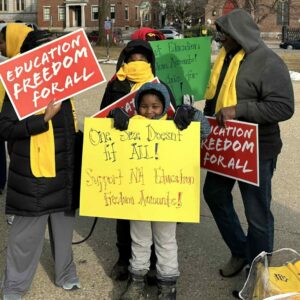Universal access to Education Freedom Accounts has passed the House. Now the legislation, SB 295, is in the House Education Finance Committee where, on Tuesday, Democrats continued to attack the popular EFA program.
But they appeared to be taken aback when a representative for a national school choice organization showed up to support the bill.
“We support SB 295 because it accomplishes three important objectives,” said Patrick Graff of the American Federation for Children (AFC). Then, he listed a series of items, including universal eligibility, a 10,000-student participation cap in year one (2026), and the program’s projected rate of growth.
When Graff began citing the successes enjoyed by other states boasting even more access to state-funded education options — specifically GOP-friendly Florida — Democrats like state Rep. Hope Damon (D-Sunapee) had some probing questions. Not about education policy but about the AFC.
“Could you tell us where the American Federation for Children is based and whether you have any presence in New Hampshire, except to come here and testify, and how you’re funded?” Damon asked.
Graff took the question in stride, pointing out AFC’s role as a national organization.
“We have state teams all over the country. We’re devoted solely to this issue of improving educational options for kids, regardless of the state context,” he said.
Damon prodded some more.
“Could you speak to us about the faith-based connection between your organization and faith communities and what your bias might be?”
Graff answered that AFC is a nonpartisan organization and “does not have any connection with specific faith communities.”
According to AFC’s website, one prominent member of the organization’s board is former Wisconsin GOP Gov. Scott Walker. Others include former Washington, D.C., City Councilor Kevin P. Chavous, and John F. Kirtley, who also serves as chairman of the Florida School Choice Fund.
“We are truly here to empower families with choice,” he said. “So, regardless of your background, you should have access to these options, and that’s been the case in every state that we’ve worked in.”
Rep. Sally Fellows (D-Holderness) also peppered Graff with questions about his background and reason for venturing to the Granite State.
“You seem to talk about trying to expand this program more and more, and not just New Hampshire, but other states,” Fellows said before pivoting to local tax rates and “taxpayers in New Hampshire who are going to have to support public schools, no matter what… And I’m just wondering, what is your endgame in this?”
Graff noted the EFA program currently consumes less than .06 percent of overall New Hampshire school spending, which set a record at $4.2 billion.
“Parents want public schools, and they will continue to send their kids to public schools, but public schools don’t work for every child,” he said. “Because of that, we want options available to every parent and student across the country, and I think that we have the opportunity in New Hampshire to do that for families here as well.”
Meanwhile, others who testified against expansion rehashed many of the same arguments made at prior hearings.
Executive Councilor Karen Liot Hill, a Democrat from Lebanon who used to serve as that city’s mayor, told the committee she’s “not here to say that vouchers are good or bad.”
“I am here to advocate for the taxpayers of our state who are facing crushing housing costs, including property taxes,” said Liot-Hill, who proceeded to mention several reasons why she believes “vouchers” are bad.
“Voucher expansion comes at the expense of our colleges and universities in my district. Voucher expansion comes at the expense of working families who, in this budget, will be forced to pay a percent of their income for basic health care. And voucher expansion comes at the expense of disabled people who will now be put on wait lists in order to receive services.”
Sen. Victoria Sullivan (R-Manchester), the lead sponsor of SB 295, took offense during her testimony over the use of the term “voucher.”
“I want to clarify that vouchers are given directly to parents or guardians to use,” she said. “Education Freedom Accounts — also referred to as education savings accounts in other states — are funds that are placed in an account that is monitored by and controlled by an organization.
“New Hampshire taxpayers and voters have made it clear that they support the efforts to expand Education Freedom Accounts.”
Last month, SB 295 advanced in the Senate on a 16-8 party-line vote. Gov. Kelly Ayotte has said she’ll sign legislation increasing access to EFAs if it reaches her desk but has stopped short of calling for immediate universal access.
The House version of the legislation — HB 115 — passed 198-180. If enacted, that proposal would phase in universal eligibility within the next two school years. SB 295, however, would eliminate the income eligibility requirement altogether within 60 days of enactment.
The EFA program allows families to use the state portion of their child’s education funding, which currently averages around $5,000, for alternatives to the public school to which the student is assigned. That money can go toward any educational program the students and families choose.
The EFA program is currently limited to families earning no more than 350 percent of the federal poverty level, or about $112,000 for a family of four.
Currently, the top argument made by Democrats opposed to the program is claiming wealthy families who have already decided on paying for private schooling are taking advantage of the EFA program.
There were 5,321 students enrolled in the EFA program at the start of the current school year.
If New Hampshire adopts universal EFA access, it will be the 16th state in the nation to do so, according to the American Institute for Economic Research.





